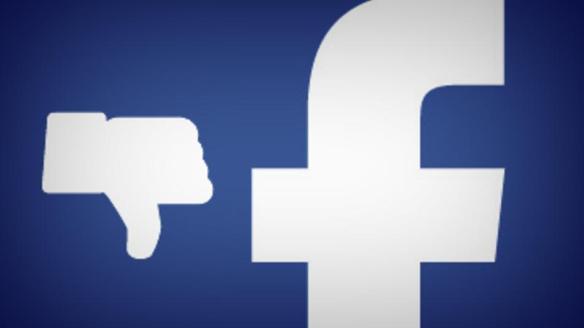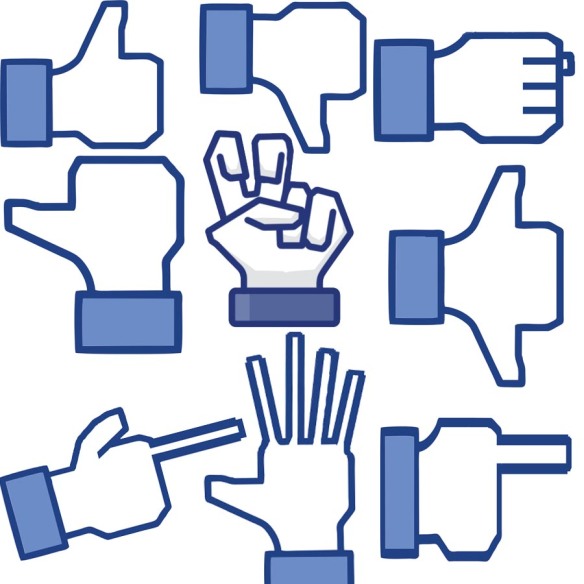One of the reasons people kept giving me for joining was that it was a really convenient way to organise social events, it being a social network and all. Meanwhile, I was convinced it was actually just a tool that allowed office-workers to waste as much of their day as possible.
So imagine my surprise (when I finally joined) to find that my friends and I were both wrong. Facebook is not a tool for wasting your employer’s money, neither is it a social networking tool, though it does a better-than-adequate impression of both. Facebook is an online tool for changing the meaning of words. And not just words, but the very concepts that are the foundations of said words.
“Facebook is an online tool for changing the meaning of words.”
Before Facebook, people liked some things and disliked other things. The word “like” had a pretty well defined meaning. It meant you… well, liked something. Now, people don’t like things, they ‘like’ things. You can even hear the inverted commas when they say it out loud. ‘Liking’ something is not the same as liking something. If you ‘like’ something, it doesn’t mean you like it, it means… well, that’s the problem: it could mean pretty much anything. Maybe it means, “I feel your pain/embarrassment/bereavement and want to reach out to you in this, your time of need but don’t know what to say and have anyhow forgotten how to use my phone and/or talk to people in RL”, maybe it means, “I make schadenfreude in your general direction”, and maybe it just means, “I read that thing you posted, and I want you to know that I read that thing you posted, just so there is no misunderstanding and you don’t accidentally think that I didn’t read that thing you posted. Because I did read that thing you posted”.
So, fine, we’ve lost the word “like” (please note my intelligent and unambiguous use of single or double quotation marks to assist you, the reader, in understanding exactly what the hell I’m talking about, you’re welcome) from the English language, and the very idea of feeling positively about a particular topic has now crawled under the house and is making a pitiful whimpering noise while it bleeds out. Does Facebook pause, sit back, and admire its handiwork? No.
That is not Facebook’s style, Facebook is a berserker with the taste of blood on its lips and a throbbing erection that will not quit until it has defiled every linguistic and conceptual construct that has previously given meaning to the crazy babbling of the sheep that offer themselves in sacrifice at its altar. “Like” was only the beginning, by the time Facebook has finished, it will be impossible to actually converse about any topic in English, ever again. And fear not; the lesser languages will be next.*
Engorged with its success, Facebook has raised the bar. So what concept has now fallen under its baleful stare? “Yes”. That’s right, “yes”, the simple act of agreement is already being ground up and twisted into a dark and hateful mockery of its former self, ala the Anakin to Vader transition, but with less horrific late-Lucas dialogue and Sir Alec Guinness wringing his hands about point-of-view. Having finally joined Facebook, I learned that my friends were right about one thing**: it’s very easy to organise social events. Or at least it would be, if people actually used the yes/no/maybe buttons to RSVP. This was pretty much the WHOLE FUCKING ARGUMENT FOR JOINING FACEBOOK IN THE FIRST PLACE, AND IT’S IRREPARABLY FUCKING BROKEN!
When someone says ‘yes’ (see, again with the quotes) on Facebook, it might mean, “yes”, it might mean, “maybe”, or, “it depends how I’m feeling on the day”, or “I don’t want to say no in case you think I’m a douche, but I’ll probably either make a lame excuse later or just not show up”, or “I must slaughter a pigeon, read its entrails, and confirm whether that is an auspicious day to travel”, or, in all likely hood, “no”. “NO” IS THE PRECISE OPPOSITE MEANING TO “YES”! “Yes” means you will come, “no” means you will not. “Yes” does not mean that you won’t come; that’s what “no” means!
People I know have said that they push ‘yes’ if they like the idea of the event, but won’t actually be attending, but the question was not, “do you like the idea of this event?”, the questions was, “will you be attending this event?” See that subtle difference? I’ve further heard it said by people that they don’t want to be rude by saying ‘no’. But is it rude to say that you won’t be attending an event that you won’t actually be attending? NO! THAT IS THE OPPOSITE OF RUDE. IT’S CALLED POLITE! That’s what people do when they RSVP: they inform you as to whether or not they’ll be coming. What’s rude is SAYING YOU’LL COME, AND THEN NOT ROCKING UP! And if I can’t appeal to basic manners, perhaps this appeal to self-interest will sway you: If you say ‘no’, you’re not coming, you’ll not receive the cascade of alerts telling you that so-and-so is going to ‘The Best Event Ever That You Said You’d Go To But You Know In Your Heart And So Do I That You’re A Filthy Liar!”, and all the associated plans that go along with that. Just sayin’.
People, let’s reclaim language. It is, after all, what separates us from monkeys, horses, small children, and Republican Presidential Candidates. Let’s allow words to have meanings again, so that when we use them, we do so for a reason: to communicate with, rather than confound, each other.
*please, it’s a joke, I am not a hate-criminial. Backed-up with rage, yes, hate-criminal, no.
**no, I don’t mean it like that; my friends are right about other things. Sometimes.



